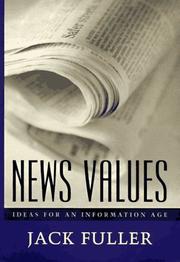| Listing 1 - 10 of 13 | << page >> |
Sort by
|
Book
ISBN: 9780226268989 0226268985 Year: 2010 Publisher: Chicago London University of Chicago Press
Abstract | Keywords | Export | Availability | Bookmark
 Loading...
Loading...Choose an application
- Reference Manager
- EndNote
- RefWorks (Direct export to RefWorks)
Affectieve neurowetenschap --- Affective neuroscience --- Audiences [News ] --- Beroepsmoraal van de journalisten --- Déontologie journalistique --- Ethics [Journalistic ] --- Informatiemaatschappij --- Information society --- Informationsgesellschaft --- Journalism--Moral and ethical aspects --- Journalisme--Morale et aspects éthiques --- Journalisten--Beroepsmoraal --- Journalisten--Ethiek --- Journalistes--Ethique --- Journalistes--Morale --- Journalistes--Morale professionnelle --- Journalistic ethics --- Journalistiek--Moraal en ethische aspecten --- Journalists--Professional ethics --- Morale journalistique --- Neuroscience affective --- News audiences --- Sociedade da informação --- Société de l'information --- Société de la connaissance --- Société du savoir --- Éthique journalistique --- Journalism --- Journalistic ethics. --- Information society. --- News audiences. --- Affective neuroscience. --- Journalisme --- Journalistes --- Société informatisée --- Lectorat (Presse) --- Déontologie --- Société informatisée --- Déontologie --- United States

ISBN: 0226268802 0226268799 Year: 1997 Publisher: Chicago (Ill.) : University of Chicago press,
Abstract | Keywords | Export | Availability | Bookmark
 Loading...
Loading...Choose an application
- Reference Manager
- EndNote
- RefWorks (Direct export to RefWorks)
-Journalistic ethics --- Journalism --- Journalistic ethics. --- Objectivity. --- Journalistic ethics --- #SBIB:309H1015 --- #SBIB:309H1025 --- Professional ethics --- Bias in journalism --- Slanted news --- Objectivity --- Press and propaganda --- Media: politieke, juridische, ethische, ideologische aspecten (incl. privacy) --- Mediaboodschappen met een informatieve functie --- Moral and ethical aspects --- Press
Book
ISBN: 0882293710 Year: 1979 Publisher: Chicago : Nelson-Hall,
Abstract | Keywords | Export | Availability | Bookmark
 Loading...
Loading...Choose an application
- Reference Manager
- EndNote
- RefWorks (Direct export to RefWorks)
Book
ISBN: 022604145X 9780226041452 1299533108 9781299533103 9780226041315 022604131X Year: 2013 Publisher: Chicago The University of Chicago Press
Abstract | Keywords | Export | Availability | Bookmark
 Loading...
Loading...Choose an application
- Reference Manager
- EndNote
- RefWorks (Direct export to RefWorks)
In the wake of Watergate, Gerald Ford appointed eminent lawyer and scholar Edward H. Levi to the post of attorney general-and thus gave him the onerous task of restoring legitimacy to a discredited Department of Justice. Levi was famously fair-minded and free of political baggage, and his inspired addresses during this tumultuous time were critical to rebuilding national trust. They reassured a tense and troubled nation that the Department of Justice would act in accordance with the principles underlying its name, operating as a nonpartisan organization under the strict rule of law. For Restoring Justice, Jack Fuller has carefully chosen from among Levi's speeches a selection that sets out the attorney general's view of the considerable challenges he faced: restoring public confidence through discussion and acts of justice, combating the corrosive skepticism of the time, and ensuring that the executive branch would behave judicially. Also included are addresses and Congressional testimonies that speak to issues that were hotly debated at the time, including electronic surveillance, executive privilege, separation of powers, antitrust enforcement, and the guidelines governing the FBI-many of which remain relevant today. Serving at an almost unprecedentedly difficult time, Levi was among the most admired attorney generals of the modern era. Published here for the first time, the speeches in Restoring Justice offer a superb sense of the man and his work.
Lawyers --- Speeches, addresses, etc. --- Addresses --- Collected papers (Anthologies) --- Discourses --- Orations --- Papers, Collected (Anthologies) --- Festschriften --- Lectures and lecturing --- watergate, gerald ford, edward h levi, attorney general, legitimacy, trust, accountability, government, department of justice, confidence, public opinion, skepticism, executive branch, electronic surveillance, privilege, separation powers, antitrust, enforcement, fbi, constituiton, nonfiction, politics, law, legal system, history, confidentiality, privacy, democracy, rights, citizenry.
Book

ISBN: 9783110755381 Year: 2021 Publisher: Berlin Boston
Abstract | Keywords | Export | Availability | Bookmark
 Loading...
Loading...Choose an application
- Reference Manager
- EndNote
- RefWorks (Direct export to RefWorks)
Digital

ISBN: 9783110755381 9783110755503 9783110755275 Year: 2021 Publisher: Berlin ;; Boston De Gruyter
Abstract | Keywords | Export | Availability | Bookmark
 Loading...
Loading...Choose an application
- Reference Manager
- EndNote
- RefWorks (Direct export to RefWorks)
Book

ISBN: 9783110697834 Year: 2021 Publisher: Berlin Boston
Abstract | Keywords | Export | Availability | Bookmark
 Loading...
Loading...Choose an application
- Reference Manager
- EndNote
- RefWorks (Direct export to RefWorks)
Book

ISBN: 9783110775167 Year: 2022 Publisher: Berlin Boston
Abstract | Keywords | Export | Availability | Bookmark
 Loading...
Loading...Choose an application
- Reference Manager
- EndNote
- RefWorks (Direct export to RefWorks)
Digital

ISBN: 9783110697834 9783110697940 9783110697711 Year: 2021 Publisher: Berlin ;; Boston De Gruyter
Abstract | Keywords | Export | Availability | Bookmark
 Loading...
Loading...Choose an application
- Reference Manager
- EndNote
- RefWorks (Direct export to RefWorks)
Digital

ISBN: 9783110775167 9783110775228 9783110775044 Year: 2022 Publisher: Berlin ;; Boston De Gruyter
Abstract | Keywords | Export | Availability | Bookmark
 Loading...
Loading...Choose an application
- Reference Manager
- EndNote
- RefWorks (Direct export to RefWorks)
| Listing 1 - 10 of 13 | << page >> |
Sort by
|

 Search
Search Feedback
Feedback About UniCat
About UniCat  Help
Help News
News